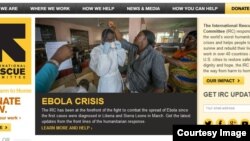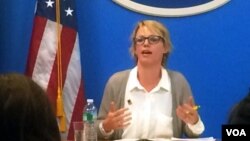Although the Ebola crisis may have abated somewhat, the fight to contain the epidemic and help its victims continues in West Africa. At a press conference in New York, Nicole Walden of the International Rescue Committee offered an update.
In the U.S. government's Foreign Press Center next to the United Nations New York headquarters, Walden told reporters about the IRC's multi-pronged efforts to fight Ebola in Liberia.
“It has ranged from investigating cases, to identifying contacts that may have interacted with infected individuals and tracing those individuals for the 21-day incubation period. We’ve supported the establishment of prevention and control mechanisms within the health facilities around the country.”
Walden explained that most of Liberia’s health facilities closed when the epidemic began to rage out of control earlier this year.
“People were too afraid," Walden said. "The health workers had no confidence in their ability to keep themselves safe. And so health facilities have basically ceased to exist in terms of malaria and ante-natal support [and] pneumonia until recently. A number of health facilities have reopened because of the support provided in training health care workers how to keep themselves safe.”
Powerful clashes between traditional African culture and Western epidemiology have complicated fighting Ebola. In African culture, a corpse is handled by many loving hands before it is buried. But health workers know that direct contact with fluids from an infected body spreads the virus.
“In the county where Monrovia sits, a couple of months ago, the situation was at such a critical level that it was decided to stop the burials and make mandatory cremation for all dead bodies," said Walden. "This was extremely, extremely unpopular and disconcerting for families. It flies in the face of every cultural norm and tradition that people have. While some communities you could get them on board with the science of it, but couldn’t reconcile the emotion of it. We are exploring all options. How could we go back to burial practices? Where is a safe location? How can we make sure that safe burials can be possible again? I think that will be happening imminently.”
When asked whether the outbreak in Liberia may getting under control, Walden offered a measured response. She said transmission rates do seem to be declining, but warned against complacency.
“This is far, far beyond a public health crisis. This is affecting every aspect of life from the economy, to schools are closed. No education is happening," she said. "People are struggling to find jobs and don’t have access to other types of health services. People are affected, their mental health, their social and emotional wellbeing and care is really starting to get highlighted as part of the response.”
Containment and treatment clinics paid for by the United States and its allies continue to be built in Liberia and other West African nations where the epidemic is most severe. Meanwhile, Ebola-related deaths continue, especially in remote rural areas where access even to rudimentary health care is scarce to nonexistent.





